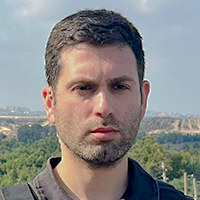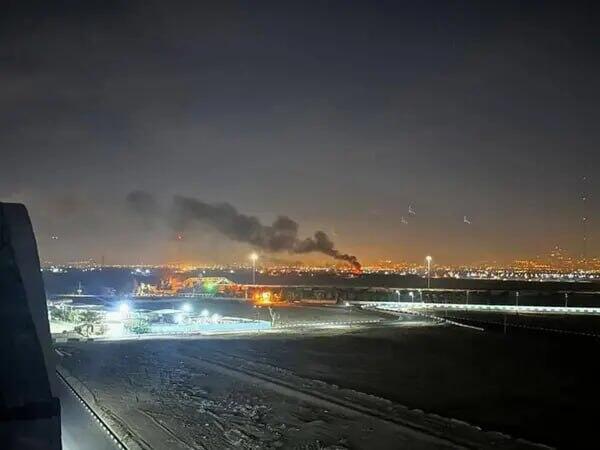Getting your Trinity Audio player ready...
About 900 miles from Israel, in the early hours of Saturday, precisely 25 days after Iran's ballistic missile attack, reports of explosions in Iran began to emerge at 2:00 AM, signaling the start of Israel's counterattack.
Arab sources document strike on Iran
For over three intense hours, across three separate waves, dozens of Israeli Air Force fighter jets and aircraft targeted military complexes, air defense systems, missile production facilities, and surface-to-surface missile launchers in Tehran, as well as in the Khuzestan and Ilam provinces in western Iran. According to the New York Times, 20 different targets were hit, though Tehran downplayed the situation in the morning, given warnings they received from the U.S. against a possible response. The Home Front Command instructions have not changed for now.
The first wave began, as mentioned, at 2:00 AM (Israeli time) with reports of explosions in Tehran, as well as in Syria and Iraq, leading to the closure of their airspace. Reports indicated that this wave primarily targeted air defense systems in all three countries, likely to allow Israeli Air Force aircraft the freedom to proceed with their strikes. However, at the time, the situation was unclear: with the sound of explosions, frightened residents in Iran took to the streets, fearing that airports in the Iranian capital might have been hit. Shortly afterward, around 2:30 AM, the IDF spokesperson officially confirmed: "The IDF is carrying out precise military strikes in Iran, in response to the ongoing attacks by the Iranian regime against the State of Israel in recent months, in accordance with the directive of the political echelon."
IDF Spokesperson Rear Admiral Daniel Hagari stated in an English-language declaration to the foreign media that Israel "has the right and obligation to respond" to Iran, "like any other sovereign country in the world." He noted the strike is a response to months of Iranian actions against Israel since October 7, including those by its proxies.
At this stage, the Iranians focused on downplaying the events, with reports from the country stating that the source of the explosion sounds was the air defense systems intercepting the IDF attack. BBC noted shortly afterward that it was unclear which sites were hit in Iran, as Tehran claimed that routine life continued, and Israel did not disclose what it was targeting other than "military targets."
Around 3:00 AM, it was reported that President Joe Biden was "closely updated" on the developments. About half an hour later, the Pentagon clarified that the U.S. was not involved in the strike in Iran, although it was informed about it. Israel, in fact, shared with the U.S. what it planned to do and did not surprise it despite Pentagon document leaks. At 4:15 AM, further reports indicated that President Biden and Vice President Harris were updated on the attack.
Documenting the damage south of Tehran
Despite this, until almost 4:00 AM, global media continued to report it was still unclear what was hit and where, also noting Syria reported Israeli airstrikes hitting military sites in its center and south. Then, reports of another wave of attacks in Iran surfaced, along with footage of interception attempts in the skies.
In this wave, Israel hit Iranian surface-to-surface missile production facilities, with an informed Israeli source stating, "The intelligence provided by the Military Intelligence Directorate in this event is science fiction beyond all imagination. The hit on factories producing surface-to-surface missiles was precise, to ensure significant impact. This is 16-digit precise intelligence (full coordinates) on an irreplaceable factory, with a precise Air Force strike, neither near nor approximate."
Meanwhile, as pilots were still in enemy territory, offices of Prime Minister Benjamin Netanyahu and Defense Minister Yoav Gallant began releasing photos of them in the Operations Directorate's command bunker. The New York Times reported that the strikes in the additional wave concluded about half an hour after they began, around 5:00 AM, targeting air defense systems, missile production facilities, UAVs, and launch sites.
"If Iran makes a mistake - we will respond."
At 6:00 AM, IDF announced that the Air Force jets had returned safely to the country after striking air defense systems and surface-to-surface missiles in Iran, stating that the operation was named "Days of Repentance."
According to the official IDF statement, "Air Force jets attacked, with intelligence guidance, missile production means that Iran launched toward the State of Israel in the past year. Simultaneously, surface-to-air missile arrays and additional aerial capabilities of Iran were attacked, which were intended to limit Israel's aerial freedom of action in Iran. IDF has many offensive operational capabilities, some of which were carried out today in striking strategic arrays deep within Iran. The State of Israel reserves the right and duty to protect its citizens if the Iranian regime continues its attacks against Israel and its citizens."
"The extent of the damages and results will be revealed later, but already there is broader freedom of action for the IDF," they said. "We are focused on the objectives of the war in Lebanon and Gaza, and Iran is pushing for regional escalation. We are at peak readiness in defense and offense, with no change in the Home Front Command instructions at the moment. We are in ongoing intelligence and operational assessment. We have proven that we can strike at any point in the Middle East."
About 20 minutes after the IDF's announcement, in a conversation with reporters, a senior White House official stated the U.S. fully backs Israel and warns Iran of "consequences" if it responds to the IDF strike — which was defined as "self-defense." According to the official, "We deployed a missile battery and acted to strengthen Israel's air defense systems in anticipation of tonight's response. President Biden and Vice President Harris have clearly demonstrated that we will always help protect Israel from Iran and its terrorist organizations."
However, in Israel, it is estimated that Iran will respond. After attempting throughout the night to downplay the results of the strikes, at 6:30 AM, it admitted for the first time that "minimal damage" was caused at several sites, but emphasized that its air defense systems successfully confronted "Israeli aggression."
Get the Ynetnews app on your smartphone:







